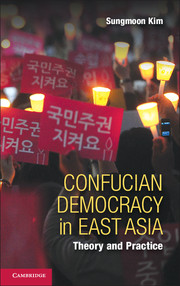Book contents
- Frontmatter
- Dedication
- Contents
- Acknowledgments
- Introduction
- Part I Beyond Thick Confucian Communitarianism and Meritocratic Elitism
- 1 Beyond Thick Confucian Communitarianism I: The Confucian Social Self and Its Discontent
- 2 Beyond Thick Confucian Communitarianism II: Toward Civil Confucianism
- 3 Against Meritocratic Elitism
- Part II Confucian Democracy in Theory – A Pluralist Reconstruction
- Part III Confucian Democracy in Practice – The Korean Case
- Bibliography
- Index
- References
3 - Against Meritocratic Elitism
Published online by Cambridge University Press: 05 June 2014
- Frontmatter
- Dedication
- Contents
- Acknowledgments
- Introduction
- Part I Beyond Thick Confucian Communitarianism and Meritocratic Elitism
- 1 Beyond Thick Confucian Communitarianism I: The Confucian Social Self and Its Discontent
- 2 Beyond Thick Confucian Communitarianism II: Toward Civil Confucianism
- 3 Against Meritocratic Elitism
- Part II Confucian Democracy in Theory – A Pluralist Reconstruction
- Part III Confucian Democracy in Practice – The Korean Case
- Bibliography
- Index
- References
Summary
Though some still remain skeptical of the possibility of Confucian democracy as an integrated value system, a great number of scholars who study East Asia are increasingly persuaded that Confucian democracy can offer a viable political alternative to liberal democracy. As we have seen in the preceding chapters, the most dominant mode of Confucian democracy suggested thus far is a Confucian communitarian democracy, and its advocates have been mainly concentrated on the communitarian critique of liberal rights-based individualism by drawing attention to the “democratic” values implicated in Confucian ritual practices.
As Daniel Bell argues, however, recent studies of Confucian democracy lack detailed institutional prescriptions. In Bell’s view, by understanding democracy as a set of values, a way of life, or a set of social conditions, the existing literature of Confucian democracy dismisses the dimension of democracy as a political system, thus offering no practical contribution to the constitutional design of Confucian democracy in the nonideal situation. Bell’s key argument is that Western-style liberal democracy is not plausible in Confucian societies, where there remains a strong tradition of respect for meritocratically chosen political elites, and therefore the most culturally relevant form of democracy in such societies is a meritocratic democracy. Thus Bell says that in Confucian societies “it is tempting to conceive of the possibility of reconciling the Confucian emphasis on rule by wise and virtuous elites with the democratic values of popular participation, accountability, and transparency.” In the same vein, Joseph Chan concludes his essay on the possibility of Confucian democracy by saying, “How to combine democracy and meritocracy is one of the most interesting and challenging issues for Confucianism today.” Echoing Bell and Chan, Tongdong Bai asserts that Confucian democracy should be a limited or thin democracy in which popular sovereignty or the citizens’ political equality is properly limited by Confucianism’s meritocratic/elitist consideration.
- Type
- Chapter
- Information
- Confucian Democracy in East AsiaTheory and Practice, pp. 72 - 98Publisher: Cambridge University PressPrint publication year: 2014

